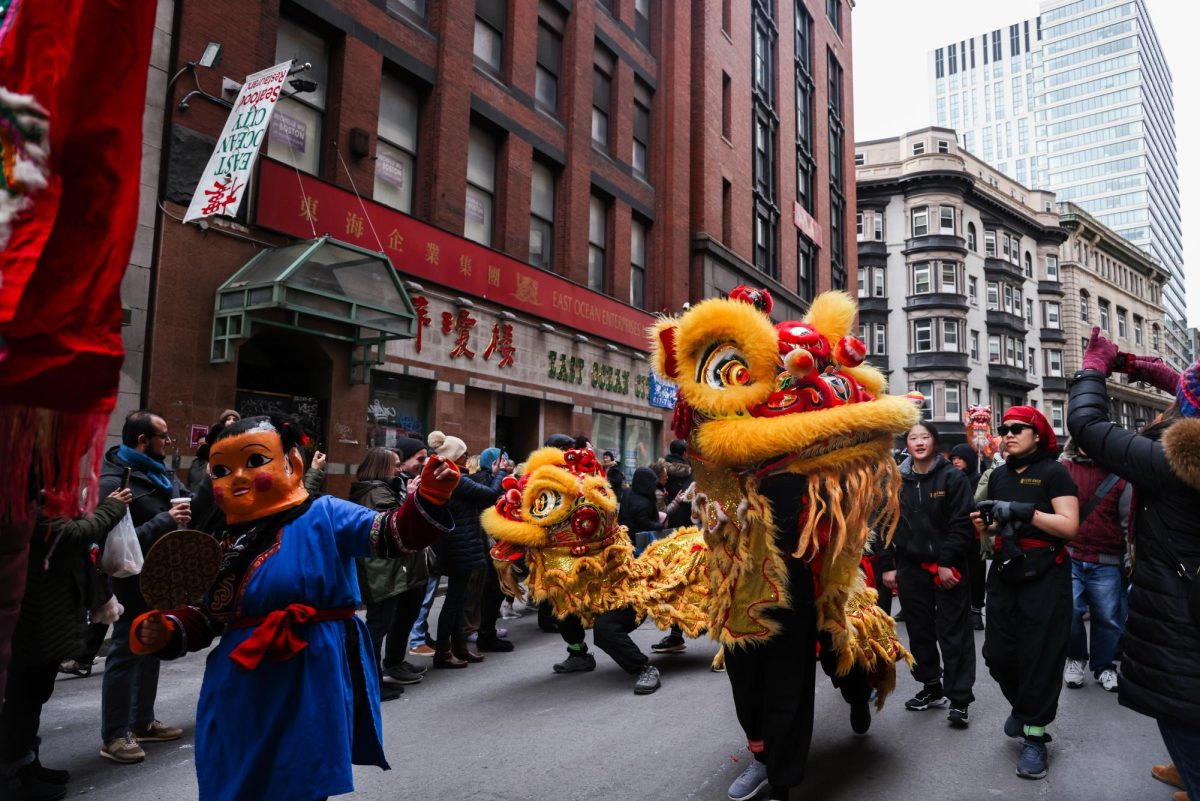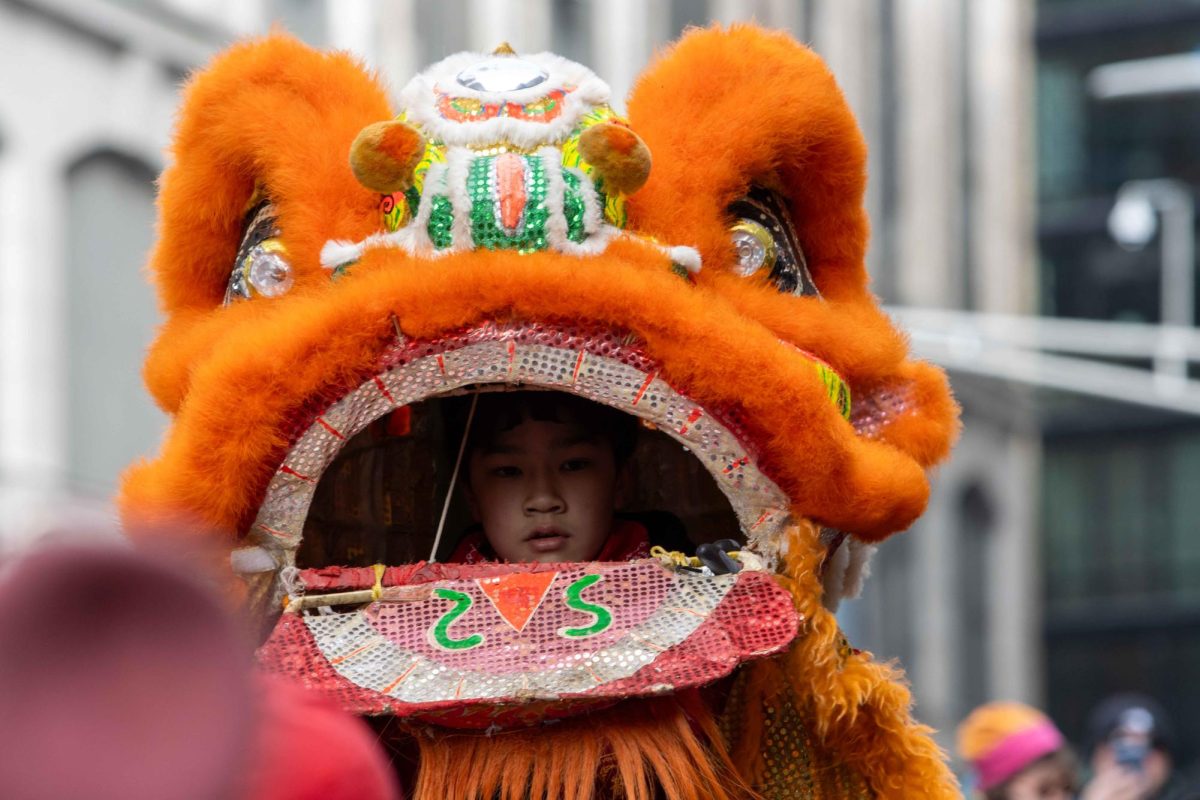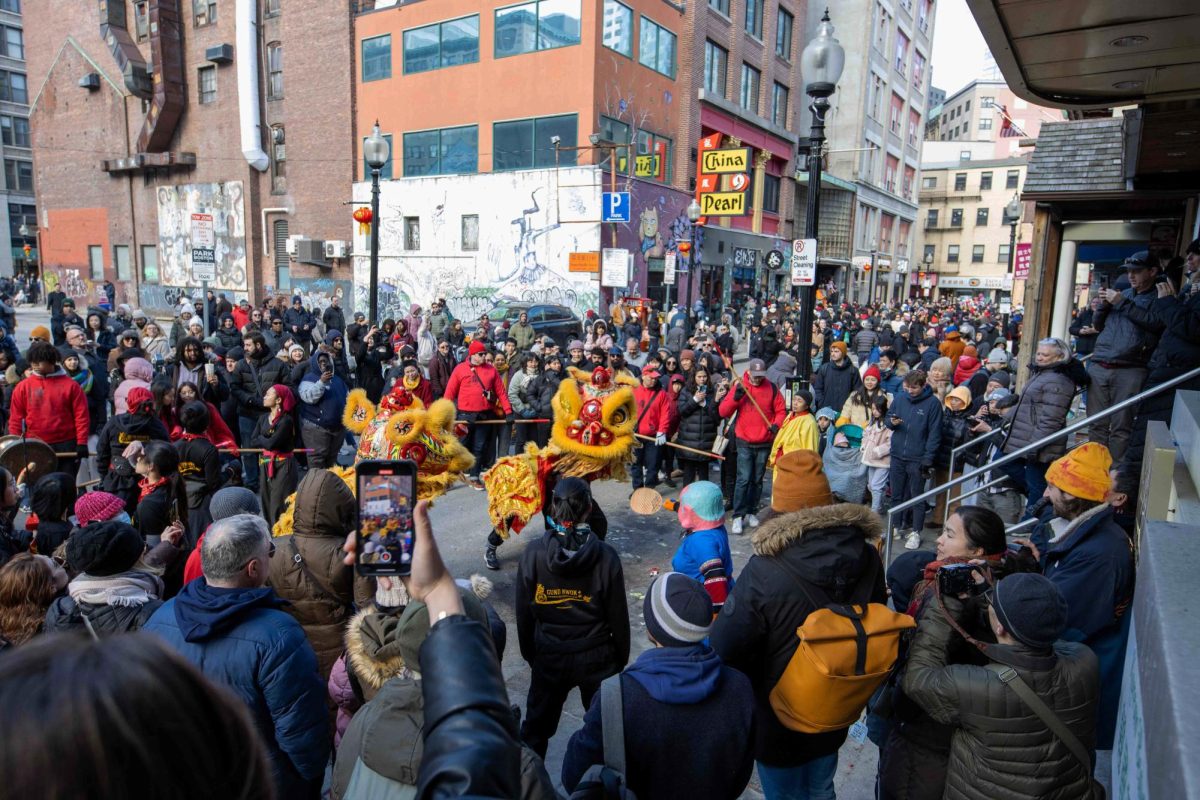The chilly morning air was filled with the sounds of beating drums, ringing bells, and exploding fireworks in Chinatown last Sunday as the 2024 Lunar New Year Parade took over the neighborhood.
The parade, which began at 10 a.m. in Phillips Square, spread all across Chinatown with dozens of floats representing Chinese organizations from the Boston area. The various groups performed blessing ceremonies at all the restaurants in the neighborhood while thousands of onlookers watched.
Most of the floats consisted of drum, gong, and cymbal players following behind processions of costumed performers in lion costumes. The percussionists would provide a backbeat as up to two performers, hidden under ornate hand-made, traditional, and historical costumes from Asian communities, would perform traditional lion dances. The lion dance is a synchronized movement between two dancers, one controlling head movements and the other the dance steps to create the illusion of free movement. The day started with traditional dragon dances as well, which saw as many as five or six people puppet a dragon costume in a similar ritual.
“Traditionally, lion dance is done by the martial arts community,” said Timothy LaValle, a volunteer from the Zhen Ren Chuan Shaolin and Hung Ga Martial Arts School in Arlington. “Now, it’s a lot more broadly done. There are people who are just dedicated to lion dancing.”

The majority of parade marchers either represented a local martial arts or dance group.
Lunar New Year is traditionally an annual 15-day festival celebration in Chinese, Vietnamese, Malaysian, and other Asian communities that begins with the first new moon and ends with the first full moon after Jan. 21. The celebrations welcome a new year marked with one of the 12 Chinese zodiac signs. 2024 is the Year of the Dragon.
LaValle and 30 to 50 other students from his school came out to march in Boston’s parade, and he has been doing so for over 15 years. A longtime practitioner of the lion dance himself, LaValle played in the background instrumentation this year due to his age.
“Usually, the lion dances for young folks,” he said.
Lion dances are a central part of the blessing ceremonies and parade festivities. The various troupes went around and performed prosperity and luck blessings on each store in Chinatown. Lions approached a store and accepted a blessing, usually oranges or cabbages, from the store owner. The lions tossed the oranges in the air and smashed the cabbages on the ground, symbolizing good fortune and luck. After this, the store owner presented the lions with a red envelope, which was meant to bring good luck to the store for the coming year, at which point the lions broke out into a choreographed dance. At the close, fireworks were set off as a way to scare off evil entities.
Around 11 a.m., remarks were heard from prominent community members like Mayor Michelle Wu and State Representative Donald Wong in Phillips Square before the crowd dispersed to watch the various processions move through the confetti-streaked streets. As the parade passed stores, they quickly became mobbed with hungry and thirsty parade participants and spectators alike, with various pop-up vendors selling balloon animals and toys, and fireworks bangs filled the air.
Henry Huang was a parade flag walker who carried ornamental red-and-yellow flags along the route. This was his second year volunteering with the parade.
“I am specifically running around and telling them that we’re coming because I speak Chinese,” Huang said. “We’ll run to the stores and be like, ‘Hey, we’re about to show up. Get ready.’ And then we do a little dance in front of them, and that’s about it.”
Huang said that the parade has always been a part of his life and cherished tradition growing up in Chinatown.
“It’s cool being a little bit more involved now than just like a passive [spectator],” he said.

Micheal Williams has been a member of the Eastern United States Kung Fu Federation and its Chinese Wushu Research Institute for Martial Arts in Chinatown for 30 years. He is a kung fu “Guru” and “Cho Dan,” or first-degree black belt. He estimated that this was his 20th festival.
Williams said this year’s parade was “pretty big.”
“They’re all pretty big and usually draw a big crowd,” said Williams.
Boston’s Chinatown is the third-largest Chinese community in the United States. Wong called this the “biggest crowd” he’s ever seen for a New Year’s Parade in his speech to the crowd.
Williams also said Lunar New Year brings a sense of community to his kung fu school and the neighborhood.
“It’s like a big family in the Kung Fu Federation,” Williams said. “If we get together, it’s just a good time.”
Chris Wong is a teenager who came to the festival with a camera in hand to take photos of the lion dances.
“This is my first time in Boston, but I’ve seen it before in San Francisco, where I’m from,” Wong said. “It’s definitely smaller, but still [has] the same energy.”
For many who took to the streets, the Lunar New Year has become a way to experience the vibrancy of Asian culture.
“It brings the community together, and it’s really a positive force in the Chinese community and Asian community in general,” LaValle said.
